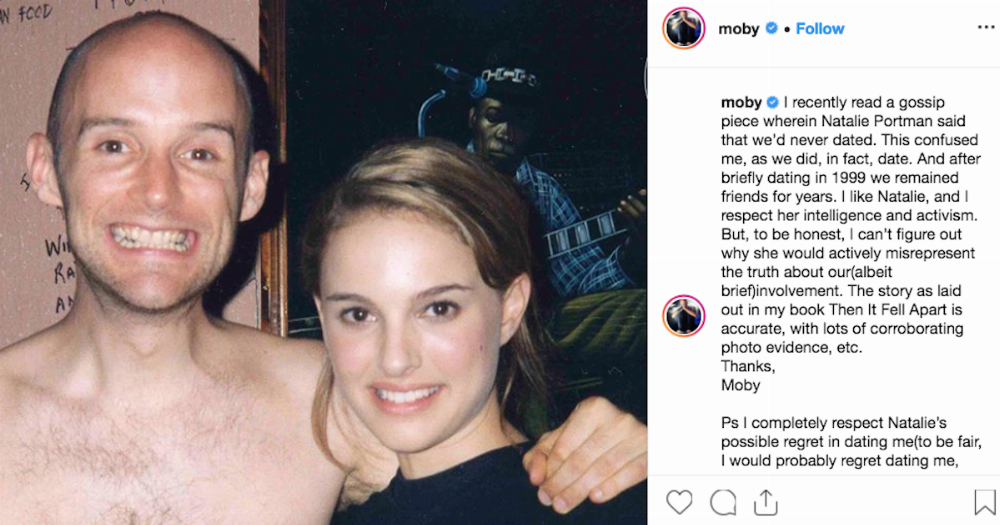The electronic musician’s “creepy” abortive seductions of Natalie Portman and Lana del Rey are not an excuse to air bigoted grievances about men in general. And Moby himself deserves pity, rather than self-righteous viciousness.
It is easy to see why Moby – who was more known than adored, even in his turn-of-the-millennium heyday when he was as ubiquitous as Ed Sheeran is now – makes such a juicy target.
The just-published second volume of his memoirs, ‘Then it Fell Apart’, serves a car-crash cocktail of insecurity and self-regard. A man who never quite believes that he made it alternately boasts about his threesomes and friendship with David Bowie, then bathes in self-pity, as he realizes that he can’t attract the celebrities and respect to match his fame.
Add a layer of ethical smugness – Moby is vegan, “spiritual,” endlessly talks about love of animals – on top, plus a newly-acquired sober humility that seems part-narcissistic part-delusional, and you have a realized comic caricature.
Also on rt.com Toxic femininity: ‘Badass’ US women demand right to torture and kill for Empire… just like menHis anecdotes from the recent cultural past were already entertaining enough to be filleted for most-read articles worldwide. But history came alive when Portman, whom Moby described “kissing under the centuries-old oak trees” at Harvard, shut him down, saying “my recollection is a much older man being creepy with me when I just had graduated high school.”

In response, Moby posted an awkward photo with Portman on Instagram, while adding that he owns more “corroborating photo evidence” of their relationship (Casablanca this is not). Collective reaction: what a loser.
From then on, striking out against Moby is just a free hit.
Not all Mobies
But, of course, it didn’t stop there. Moby couldn’t just be Moby, a single middle-aged man with poor dating instincts.
Moby became all "rich white” men.
Moby became the predatory "older men" sleazing after “a teenager barely out of high school” (both parties were adults past the age of consent)
Moby became all the “beta males” and “nice guys” – those who hide their carnal desires behind a friendly persona.
Finally, Moby became “the patriarchy,” or just“men.”
I am sure that all of the above authors – predominantly women, and a few “allies” of whom Moby used to be one – think they know their own Moby, and yes, he does represent a certain recognizable model of male behaviour.
But using him to attack a whole class of people – based on race or gender – is pure prejudice.
And while these authors think they are performing some deep socio-cultural analysis, what they are actually doing is using a single anecdote to say “look at men, aren’t they bastards/creeps/idiots” leveraging it as self-vindication for their own unsuccessful brushes with men.
After all, among the dozens of think pieces, there isn’t one deeply analysing why fame and wealth gives this apparently unattractive individual the cachet for his cornucopia of conquests, or why Western culture teaches men that acting like Moby – since he is, apparently, so representative – is the way to a woman’s heart.
Lessons for men
In fact, what the episode is most reminiscent of is school gossip – where some socially-maladjusted nerd is picked as the scapegoat, and the 'Mean Girls' point and laugh. As in many recent public eviscerations, there is much self-congratulatory virtuousness, but no empathy, and one assumes that all of the authors piling in have never acted like fools in relationships, because that would make them hypocrites.
It’s not like Moby is even a villain. By telling these stories he made himself vulnerable, admitting to his mistakes, trying to correct his wrongs, even if he lacks the requisite self-awareness. He's even apologized (like that will work). Yes he is pure cringe, but is the cruelty needed?
Additionally, we weren’t there in 1999 – kissing and telling never makes a man look good, but Natalie Portman could also be denying things that really happened out of understandable embarrassment. Or maybe they had just different views of what constituted a relationship, like those old sitcom jokes about men adding to the tally of past sexual partners, and women subtracting. The point is, do we have to take a side?
Which leads to the next issue: while those who mock Moby say they are doing so for moral reasons, there is the sneaking suspicion that something more personal is going on. As a short, bald, scrawny, bearded, geeky man in a T-shirt, Moby is to many viscerally repulsive – “creepy” – so his view, his whole life narrative is dismissed, just like the same feminist authors say men ignore overweight women. I dare you to tell me that if Brad Pitt published the same memoir repeating every single story he would get the same mockery, or that people would so instantly take Portman’s word over his.
For all this, there is a lesson in this story for all other men, however much they don’t like being lumped together with its protagonist (and it’s not “being tall is important” – we know). It is: don’t try to plaster over your insecurities with sex – they will bubble to the surface anyway. Work on your self first. And, secondly: don’t try to seem 'nicer' than you really are, women will suss it out, and it’s probably not that attractive anyway. If we can do this, Moby’s cautionary tale will not have been for naught.
By Igor Ogorodnev
Igor Ogorodnev is a Russian-British journalist, who has worked at RT since 2007 as a correspondent, editor and writer.


